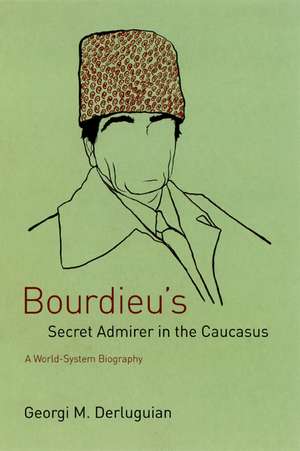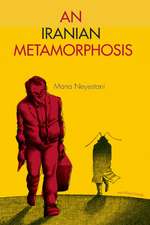Bourdieu's Secret Admirer in the Caucasus: A World-System Biography
Autor Georgi M. Derluguianen Limba Engleză Hardback – 4 aug 2005
Bourdieu's Secret Admirer in the Caucasus is a gripping account of the developmental dynamics involved in the collapse of Soviet socialism. Fusing a narrative of human agency to his critical discussion of structural forces, Georgi M. Derluguian reconstructs from firsthand accounts the life story of Musa Shanib—who from a small town in the Caucasus grew to be a prominent leader in the Chechen revolution. In his examination of Shanib and his keen interest in the sociology of Pierre Bourdieu, Derluguian discerns how and why this dissident intellectual became a nationalist warlord.
Exploring globalization, democratization, ethnic identity, and international terrorism, Derluguian contextualizes Shanib's personal trajectory from de-Stalinization through the nationalist rebellions of the 1990s, to the recent rise in Islamic militancy. He masterfully reveals not only how external economic and political forces affect the former Soviet republics but how those forces are in turn shaped by the individuals, institutions, ethnicities, and social networks that make up those societies. Drawing on the work of Charles Tilly, Immanuel Wallerstein, and, of course, Bourdieu, Derluguian's explanation of the recent ethnic wars and terrorist acts in Russia succeeds in illuminating the role of human agency in shaping history.
Exploring globalization, democratization, ethnic identity, and international terrorism, Derluguian contextualizes Shanib's personal trajectory from de-Stalinization through the nationalist rebellions of the 1990s, to the recent rise in Islamic militancy. He masterfully reveals not only how external economic and political forces affect the former Soviet republics but how those forces are in turn shaped by the individuals, institutions, ethnicities, and social networks that make up those societies. Drawing on the work of Charles Tilly, Immanuel Wallerstein, and, of course, Bourdieu, Derluguian's explanation of the recent ethnic wars and terrorist acts in Russia succeeds in illuminating the role of human agency in shaping history.
| Toate formatele și edițiile | Preț | Express |
|---|---|---|
| Paperback (1) | 324.08 lei 6-8 săpt. | |
| University of Chicago Press – 15 iul 2005 | 324.08 lei 6-8 săpt. | |
| Hardback (1) | 566.73 lei 3-5 săpt. | +28.23 lei 7-13 zile |
| University of Chicago Press – 4 aug 2005 | 566.73 lei 3-5 săpt. | +28.23 lei 7-13 zile |
Preț: 566.73 lei
Preț vechi: 622.78 lei
-9% Nou
Puncte Express: 850
Preț estimativ în valută:
108.45€ • 115.96$ • 90.42£
108.45€ • 115.96$ • 90.42£
Carte disponibilă
Livrare economică 27 martie-10 aprilie
Livrare express 13-19 martie pentru 38.22 lei
Preluare comenzi: 021 569.72.76
Specificații
ISBN-13: 9780226142821
ISBN-10: 0226142825
Pagini: 416
Ilustrații: 2 maps, 6 tables, 4 line drawings
Dimensiuni: 152 x 229 x 30 mm
Greutate: 0.67 kg
Editura: University of Chicago Press
Colecția University of Chicago Press
ISBN-10: 0226142825
Pagini: 416
Ilustrații: 2 maps, 6 tables, 4 line drawings
Dimensiuni: 152 x 229 x 30 mm
Greutate: 0.67 kg
Editura: University of Chicago Press
Colecția University of Chicago Press
Notă biografică
Georgi M. Derluguian is associate professor in the Department of Sociology and the International Studies Program at Northwestern University. He is coeditor of Questioning Geopolitics.
Cuprins
Maps
Photos
Introduction: Does Globalization Breed Ethnic Violence?
1. The Field
2. Complex Triangulations
3. The Dynamics of De-Stalinization
4. From 1968 to 1989
5. Social Structure
6. The Nationalization of Provincial Revolutions
7. The Scramble for Soviet Spoils
Theoretical Reprise: Possibility
Tables
Figures
Notes
Bibliography
Index
Photos
Introduction: Does Globalization Breed Ethnic Violence?
1. The Field
2. Complex Triangulations
3. The Dynamics of De-Stalinization
4. From 1968 to 1989
5. Social Structure
6. The Nationalization of Provincial Revolutions
7. The Scramble for Soviet Spoils
Theoretical Reprise: Possibility
Tables
Figures
Notes
Bibliography
Index
Recenzii
"Derluguian is endowed with a special ability to show how the grinding wheels of world history affect actual human lives."
"As good an overview as one could find."
"This book addresses the vital question of why there has been a resurgence of ethnic violence since the break-up of the Soviet Union. It far exceeds previous work on the subject and gives us the best understanding we have so far on how ethnic identity emerges and takes a militarized form. Derluguian presents his findings in engaging and clearly written prose. This book deserves and will receive a great deal of attention."
"Derluguian's writing is lively, evocative, often very insightful, and based on enormous knowledge and wide theoretical reading. His detail comes from a deep local knowledge of his subjects, his immersion in the context that he is describing, and interviews with leading participants. The verve and drive in both the personal and the analytical make Bourdieu's Secret Admirer in the Caucasus a terrific read."
"Bourdieu's Secret Admirer in the Caucasus is an extraordinary book by any standards. . . . What the author has written is no less than a theoretical and empirical explanation of the late Soviet and early post-Soviet society that spins out a highly sophisticated explanation of how the Soviet Union broke up and why nationalist conflict broke out in the Caucasus."
"A bright, original, and highly evocative exploration of how ethnic violence emerged in the Caucasus amid the collapse of the Soviet Union. . . . Derluguian is ambitious. He is bent on using Shanib's biography and the events in Chechnya, Abkhazia, and Kabardino-Balkaria to unite the theories of Bourdieu, Tilly, and Wallerstein, then to deploy the amalgam to explain the when and why of ethnic violence." --Foreign Affairs
“Bourdieu’s Secret Admirer in the Caucasus is, without a doubt, the most engaging and deeply analytical guide to this knotty region to have been produced in the past decade. It is even more than that, however, for Derluguian is concerned with answering three gigantic questions about East European and Eurasian affairs. Why did the Soviet Empire collapse? Why did it do so violently in some areas but relatively peacefully in others? And what accounts for the diversity of new polities—from rigid sultanates to consolidated democracies—that now stand on its ruins? . . . There is nothing more universally modern than purveyors of ancient identities. . . . Derluguian tells how much of Eurasia, in only a decade and a half, traded the promise of liberty and democracy for a political and moral captivity that will be difficult to escape. Clever, original and at times downright funny, Bourdieu’s Secret Admirer in the Caucasus is both an intimate biography of an unusual Circassian sociologist and an epic account of an entire generation’s trek through modernity. It uncovers the hidden logic behind the tragedies and horrors of the Caucasus—indeed, of the entire late twentieth-century world—and shows how seemingly senseless acts of violence have discernible, and often rather pedestrian causes.”
"Derluguian’s method of elaborating class formations, their reformations and historical alliances through the technique of ethnography is an ingenious juxtaposition, making for a text that is both sociologically revealing and narratively gripping. His is a new form of class analysis, based on observation of the micro-sociological details of everyday life; but it also projects the political implications of those ground-level class alliances, and helps to reveal the processes that turn susceptibility to violent breakdown into actuality. . . . Bourdieu’s Secret Admirer in the Caucasus gives direction to future work on the perils of authoritarian decline."
"A close account of nationalist mobilization in the Caucasus in the 1990s, and a magisterial overview of how the disintegration of Soviet developmentalism fits into the broader end of developmentalism at a global level. An instant classic, the book stands as a benchmark for understanding the Soviet collapse."
"Derluguian, who . . . certainly seems to know his way around the region, presents an astounding series of . . . interwoven details. These details are also interwoven into an equally complex and rich sociological analysis."
"This book defies with astonishing ease any attempt to define its academic genre, and it would be insipid and simply unsatisfactory to describe the wide-and-deep reaching research that informs the inexhaustibly inventive narrative as cross-disciplinary. . . . The book examines attentively the shifting social compositions and institutional settings of the disintegrating Soviet Union. . . . The main avenue of anallysis, however, leads far beyond the domain of sociology and deals with the broader consequences of the failure of states employing developmentalist ideologies and strategies. . . . A university library that misses this book denies its students a true joy of learning."
Descriere
Descriere de la o altă ediție sau format:
Drawing on the work of Charles Tilly, Immanuel Wallerstein, and, of course, Bourdieu, Derluguian's explanation of the recent ethnic wars and terrorist acts in Russia succeeds in illuminating the role of human agency in shaping history.










